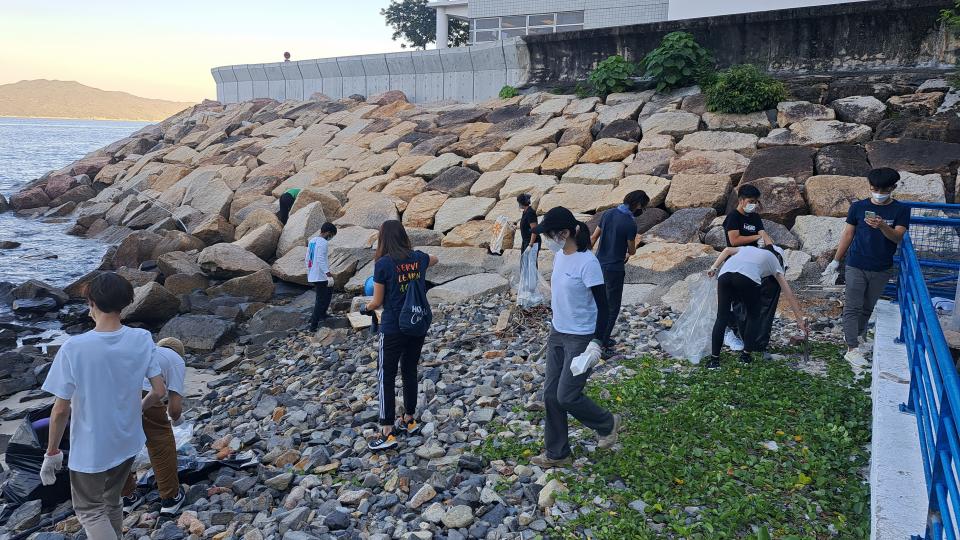Water Management
HKUST’s water management approach aims to steward water resources in a data-informed, holistic, and sustainable manner. Recognizing the interconnected challenges of water resources, the key elements of our strategy include the promotion of efficient water consumption, the protection of water ecosystems, and the advancement of research and technologies that support water conservation.
Our water management strategy begins with measuring water consumption from all sources on campus, from residences and staff quarters to landscaping irrigation. This enables the University to minimize wastage and optimize the use of available water resources through enhanced technology and practices.
We engage all campus stakeholders from individuals, to caterers, to our contractors on the importance of the responsible use of water, encouraging them to adopt water-saving techniques at home and in their daily activities and empowering them to engage in water management decisions.
The University pursues water-sensitive design, seeking to minimize our use of fresh water through re-use or rainwater capture, while also protecting our water ecosystem from pollutants. We are also mindful of designing our campus to adapt to changing condition caused by climate change and population growth.
To align with our HKUST 2028 Sustainability Challenge, we have committed to limit potable water consumption to less than 500,000 cubic meters by 2028, a bold challenge due to the growth in our campus buildings and population.
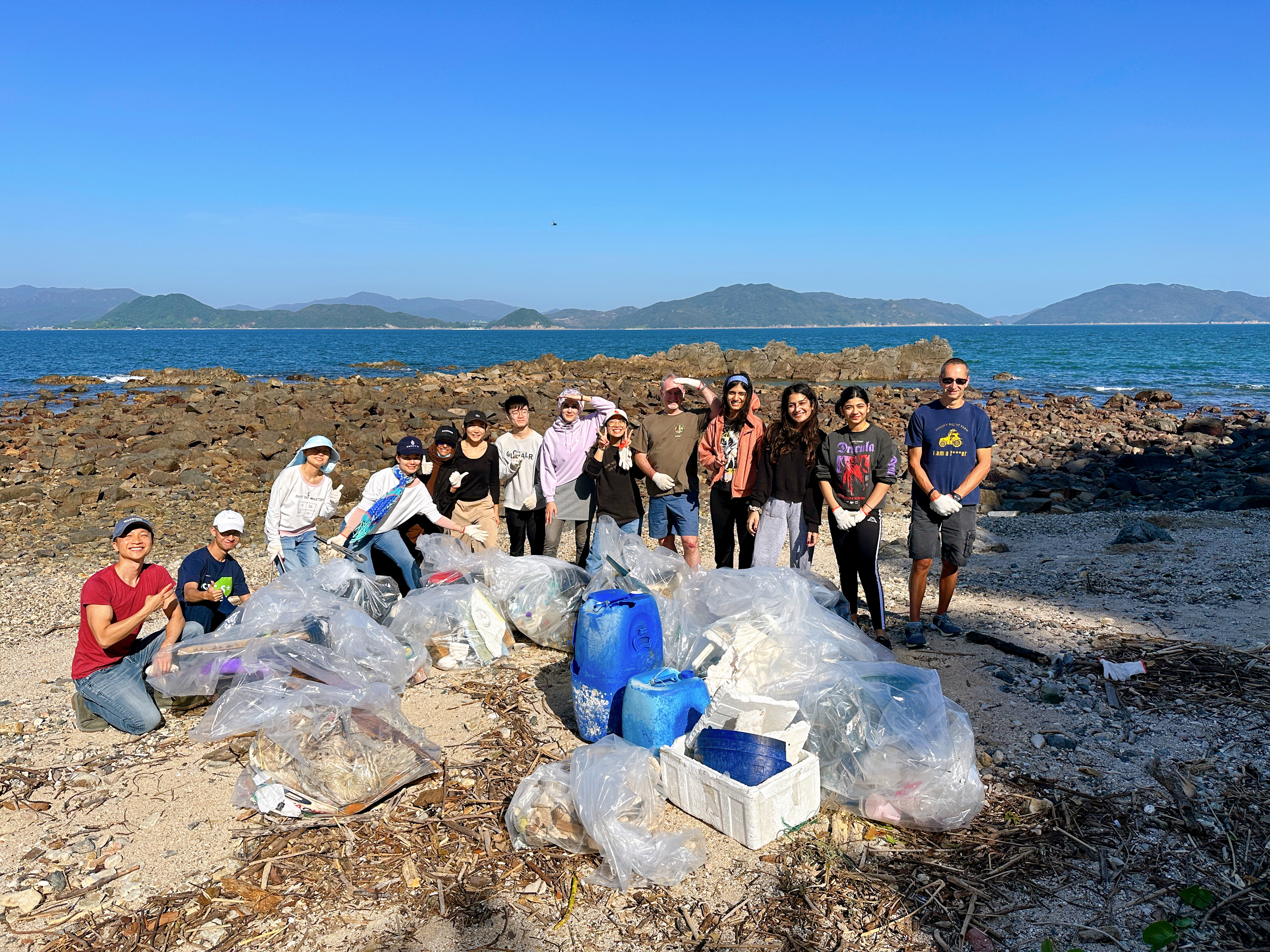
Category |
2022-23 Tactic |
2022-23 Progress & Key Activities |
Water Consumption Reduction |
Retrofit all showerheads in staff quarters and residence halls with low flow models. Implement behavior change strategies that nudge residents towards more water savings actions. | Piloted smart and water-efficient showerheads for 1,034 residents of student halls. |
Use of Non-Potable Water Sources |
Recommission existing underground water tanks. | Recommissioned the underground tank near One University Road, saving 10 cubic meter per month. |
| Identify ways to optimize use of rainwater and recycled water. | Reuse system for bleed-off water of the Library cooling tower completed. Tender and submission for connection of condensation water from Primary Air Handling Unit (PAU) at the Library cooling tower for reuse underway. Provision allowed for future greywater connection in the new Research Building 2. |
-
Water use governance: HKUST continuously strives to tracks and reduce our potable water use.
-
The Water Reduction Working Group identified water saving strategies for existing potable water use for our student halls, catering outlets, cooling towers, laboratories and irrigation. Smart and/or Grade 1 showerheads will be replaced for nearly 100% of the showerheads in the student halls. Baseline monitoring of irrigation demand is also underway.
-
The Green Lab Working Group address water-related issues within laboratories. They achieve this by conducting thorough analysis through measurement and establishing KPIs, implementing sustainable practices and promoting efficient resource management in lab environments.
-
The Cleaning Steering Committee meet bi-monthly to discuss issues relating to efficient and sustainable cleaning practices at HKUST, including the use of environmentally friendly cleaning agents and water efficiency during cleaning.
-
For more details of our committees here.
-
-
Water consumption tracking: Potable water is supplied by the Hong Kong Water Supplies Department and is used for cooking, cleaning, showers, and drinking. Our toilets use seawater from the Clear Water Bay. Our monthly potable water and seawater consumption is tracked and with the performance data shared publicly on our Water Performance website. For further details, please refer to our ESG Report for water consumption performance and operation projects under the Environment – Water section.
-
Water reuse measurement:
-
Rainwater reuse: Rainwater reuse is adopted in the Jockey Club Global Graduate Tower for irrigation. With a 37 cubic meter tank, around 10 cubic meter of potable water consumption is reduced per month, reducing 100% of irrigation demand of the 950 meter square of landscape area. Similarly, the underground water well at One University Road reuses rainwater for plant irrigation. This reduces potable water consumption by 10 cubic meter per month and water consumption by 100%.
-
Cooling tower bleed-off reuse: The cooling towers bleed-off at the HKUST Library will be used to supply water for toilet flushing. 2,140 cubic meter of bleed-off water is now expected to be reused for flushing every year.
-
Air-conditioning condensate reuse: The condensate from the air handling units (AHUs) inside the library building is also collected and pumped to the cooling tower. The designed daily volume of water reused for flushing is 5.9 cubic meter.
-
Seawater flushing and cooling: Seawater consumed for flushing and cooling are also measured and shared publicly.
-
Our ESG Report further details our water consumption performance and operation projects under the Environment – Water section.
HKUST prioritizes protecting and enhancing water quality in our surrounding environment to safeguard ecosystems and the health and well-being of people and communities.
-
Discharge requirements: The university is committed to adhering to discharge requirements outlined in Section 21(1) of the Hong Kong Government's Water Pollution Control Ordinance (CAP 358, S21) and Technical Memorandum on Effluent Standards. To ensure strict compliance with this ordinance and promote environmental protection, HKUST has implemented comprehensive limitations and restrictions on dischargeable substances in accordance with Environmental Protection Department (EPD) standards.
-
Hazardous waste discharge controls: Due to legal conditions governing HKUST's wastewater stream, students, technicians, and researchers must avoid disposing of any solid or liquid chemical waste into sinks connected to the sanitary sewer system. As outlined in the policy "Chapter 16: Guidelines for Good Hazardous Waste Practice," only simple alkalis and acids neutralized to a pH range of 6–10 can be disposed of into the sewer system. This practice ensures that discharged wastewater poses minimal environmental risks.
-
Monitoring: To ensure our compliance with EPD regulations, for each wastewater stream, HSEO conducts regular monitoring and comprehensive chemical analysis of samples. Additionally, HSEO periodically evaluates the sewage line in the sewage tunnel to Tseung Kwan O and measures stream flow at an access point in the tunnel.
-
Construction run-off: In addition, all campus construction and maintenance work, whether done by in-house staff or contractors, must follow the University’s requirements of minimizing surface runoff and preventing the discharge of dirty water into storm water drains.
-
Kitchen discharge: As stipulated by the HKUST Sustainable Catering Policy, catering outlets must utilize Environmentally Preferable Cleaning Chemicals (EPCC) that are consistent with the criteria established by the Hong Kong Green Label Scheme, or be certified by one of the following green labelling organizations: Ecologo; Green Seals; US EPA Design for the Environment; or China Environmental Label.
More information about the University's water discharge standards and guidelines can be found in our policy document: Chapter 19, Liquid Effluent and Protection of Watershed and Aquatic Environment.
Stormwater drains discharge directly into the nearest body of water, Port Shelter, without treatment. Therefore, proper management and care are crucial for protecting surrounding watersheds. HKUST has implemented several stormwater management initiatives to control pollutant contributions from both stormwater and non-stormwater discharges. These efforts aim to safeguard the watersheds affected by the university's operations.
HKUST's watershed management strategy protects Hong Kong's coastal ecosystems, focusing on the location-specific diversity of aquatic species, such as native corals, seagrasses, and fish in the Port Shelter watershed. The university employs various measures to prevent polluted water from entering storm drains, including:
-
Storm drains maintenance: Regular maintenance and cleaning of storm drains to remove debris and sediment.
-
Illegal discharge reporting: Proactive reporting, investigation and cessation of suspected illegal discharges into open drains on campus.
-
Construction standards: Implementation of the HKUST Net-Zero Building Standard to ensure all campus construction and maintenance work—whether conducted by in-house staff or contractors—adheres to the University's requirements for minimizing surface runoff and preventing the discharge of contaminated water into stormwater drains.
-
Construction waste water management standards: This requires adequate construction waste water mitigation measures as stipulated by the BEAM Plus standards (see Section 4.6.2). HKUST’s new buildings are required to obtain BEAM Plus Platinum (section 4.5) which requires an Environmental Management Plan as a prerequisite (IDCM P2 – pages 39-40). Water quality discharge quality and management forms part of this. For our construction sites, the practices outlined in Practice Note for Professional Persons on Construction Site Drainage (ProPECC PN 1/94) are followed during the construction phase in order to minimize the water quality impact due to construction site drainage.
-
Stormwater management building standards: Through the HKUST Net-Zero Building Standard, it is a requirement for new buildings and major renovations to demonstrate that adequate stormwater management design measures have been provided to cater the total volume of runoff for one hour corresponding to a design rainfall of at least 40mm/event for the site in its post-developed conditions (see Section 4.6.3). Under Section 4.6.8, the design team must show how the site ecology can be used for water processing and retention for “sponge city” benefits.
-
-
No chemical fertilizer policy: Wood chips and on-campus mulched leaves on exposed soil have been used to retain moisture and natural nutrients. Organic fertilizer are used instead of chemical fertilizer to reduce water pollution and as part of watershed management. Our ESG Report further details this under the Environment – Landscape & Biodiversity section.
-
Policies: Comprehensive policies (Chapter 16, Chapter 19) and educational programs to raise awareness among students, staff, and faculty about proper waste disposal and the impact of pollutants on local watersheds.
These initiatives not only protect surrounding aquatic ecosystems but also contribute to the university's broader sustainability goals. Through active stormwater management and pollution prevention, HKUST demonstrates its commitment to environmental responsibility and sets an example for other institutions and the community at large to follow.
-
Building standard: Through the HKUST Net-Zero Building Standard, it is university policy to mandate the use of water recycling and reuse where possible.
-
Performance-based targets for potable water (section 4.4): The performance goal requires net-zero potable water for the building measured on an annual basis. Net-zero water is achieved when the total amount of alternative water produced from the building and used on campus offsets the amount of potable water consumed by the building. Other measures to maximize water reuse and recycling are also included in section 4.6.6.
-
Water harvesting and recycling: Harvested rainwater and recycled grey water to achieve at least 10% or more potable water reduction.
-
Air conditioning condensate water reuse: Condensate water from air conditioning systems shall be used for irrigation, toilet flushing, or other grey water purposes. Sub-metering shall be in place to track water reuse.
-
Other water reuse: Rainwater and cooling tower bleed-off reuse shall be maximized wherever possible.
-
Water reuse measurement: Sub-metering shall be in place to track water reuse.
-
- New building & renovation standards: For new buildings and existing building renovations above 5000m2, the HKUST Net-Zero Building Standard applies. It aims to minimize potable water use through these key measures:
-
Performance-based targets for potable water (section 4.4): The performance goal requires net-zero potable water for the building measured on an annual basis. Net-zero water is achieved when the total amount of alternative water produced from the building and used on campus offsets the amount of potable water consumed by the building. Other measures to maximize water reuse and recycling are also included in section 4.6.6.
-
Water efficient fittings appliances (section 4.6.6): For all buildings, have 100% of sanitary fittings and appliances shall be certified Grade 1 under Hong Kong Government Water Supplies Department’s Water Efficiency Labelling Scheme, or most water efficient rating of an equivalent certification scheme for water consuming equipment.
-
Efficient cooling tower water use (section 4.6.6): Adopt 7 or more cycles of concentration with acceptable water quality. Measures such as water consumption sub-metering, water loss controls, and water usage controls shall be provided.
-
Life cycle cost analysis (section 2.2): All water-consuming purchases and investments must use Life-Cycle Cost Analysis in cost-benefit analyses.
-
Water use monitoring: Water consumption sub-metering for potable water use shall be provided.
-
Stormwater discharge & construction wastewater discharge: Adequate measures to manage stormwater discharge during operation (section 4.6.3) and construction wastewater discharge (section 4.6.2) shall be provided.
-
-
Procurement standards: The HKUST Sustainable Purchasing Requirements for Suppliers and Contractors mandates all water-consuming sanitary fittings and plumbing fixtures shall meet Water Suppliers Department (WSD) Water Efficiency Labelling Scheme (WELS) Grade 1 rating or other equivalent international schemes.
-
Renewal standards: The HKUST Sustainable Office Standards & Guidelines recommend that water appliances purchased shall have “Water Sense” conservation levels.
-
Catering standards: For our food and beverage outlets, the HKUST Sustainable Catering Policy requires caterers to undertake all measures necessary to minimize water consumption through selecting best-in-class efficient equipment.
HKUST is committed to preventing and reducing marine pollution of all kinds, particularly from land-based activities:
-
Environmental Building Standards: HKUST has pledged to achieve a high environmental standard—Platinum Level in Building Environmental Assessment Method Plus (BEAM Plus)—for all new campus buildings (see Section 4.5). This standard includes strict restrictions on runoff from campus construction, ensuring minimal impact on surrounding water bodies. An Environmental Management Plan as a prerequisite (IDCM P2 – pages 39-40). Water quality discharge quality and management forms part of this. (see Section 4.6.2). All campus construction and maintenance work, whether performed by in-house staff or contractors, must adhere to university requirements for minimizing surface runoff and preventing the discharge of contaminated water into storm water drains. Please refer to the HKUST Net-Zero Building Standard.
-
Sustainable Landscaping Guidelines: HKUST employs sustainable landscaping practices that minimize the use of harmful chemicals and reduce water runoff, helping to protect nearby aquatic ecosystems. Our ESG Report further details this under the Environment – Landscape & Biodiversity section.
-
Whole Community Commitment: A crucial area of resource conservation and environmental preservation is protecting the natural environment surrounding our campus, including the flora and fauna that inhabit the watershed and the HKUST seacoast. Our university strives to minimize physical, chemical, and biological alterations to land and aquatic ecosystems. Community members must dispose of trash properly when visiting the coastline for observation or recreation. We encourage respect for marine life, especially when low tides allow access to coastal tide pools. It's essential to sustain the remaining sea animals to allow them to reproduce and replenish depleted stocks that once thrived in these coastal areas. The continual removal of all life forms along the seacoast is a destructive practice that has significantly reduced the ability of different species to reproduce, leading to the disappearance of many once-plentiful species in this area. HKUST community members are urged to actively preserve the natural environment by safeguarding both land and aquatic ecosystems. This commitment is further elaborated in Section D of Chapter 18 (Resource Conservation and Environmental Preservation) of the HKUST Safety and Environmental Protection Manual, which contains the university’s environmental policies.
-
Governance: The HKUST biodiversity committee meets bi-monthly to review sustainable landscaping practices including improving water efficiency of existing landscaping practices including water conscious planting.
-
Building standard: The HKUST Net-Zero Building Standard policy requires water conscious planting and water efficient irrigation (section 4.6.6) through the below requirements:
-
Water efficient planting: No potable or well water should be used for landscaping purposes (except within first 2 years to help establish the plantings). Native species and/or drought- tolerant plants shall be adopted to minimize water use.
-
Water use monitoring: Water consumption sub-metering for irrigation shall be provided.
-
-
Controls: To strictly adhere to the Hong Kong government’s Water Pollution Control Ordinance (CAP 358, S21), and ensure environmental protection, HKUST has implemented comprehensive limitations and restrictions on dischargeable substances according to Environmental Protection Department (EPD) standards. The University has developed a detailed framework for managing liquid waste, with specific guidelines for permissible materials and disposal methods. Substances allowed for disposal include diluted inorganic acids, alkalis, and non-toxic inorganic salts in aqueous solutions and at a concentration not exceeding the Government regulations. Also, these substances must be neutralized to be within a pH range of 6–10 prior to disposal, ensuring that the discharged wastewater poses minimal environmental risks. All campus construction and maintenance work, whether done by in-house staff or contractors, must follow the University’s requirements of minimizing surface runoff and preventing the discharge of dirty water into storm water drains.
-
Monitoring: In addition to these disposal guidelines, HKUST maintains a proactive approach to prevent water system pollution, and follows stringent monitoring requirements specified by EPD in our Wastewater Discharge Permits, through regular campus wastewater sampling and analysis. The University conducts monthly examinations of wastewater samples from designated points within its wastewater system. The analyses are meticulously carried out by HSEO Lab, which maintains a testing and calibration laboratory accreditation according to the international standard ISO/IEC 17025. Monitoring results are submitted to EPD to demonstrate compliance with the regulations. This ongoing monitoring process allows the University to quickly identify and address any potential water pollution issues, maintaining a high standard of environmental stewardship.
-
Policies: More information about the University's protocols for safeguarding against water system pollution can be found in our policy document: Chapter 19, Liquid Effluent and Protection of Watershed and Aquatic Environment.
-
HKUST sustainable food operation policy and Sustainable catering policy: As part of the HKUST Sustainable Food Operation Policy and HKUST Sustainable Catering Policy, the University mandates that all managed caterers create a plan for sustainable food practices to minimize environmental impacts on aquatic systems. The plan should incorporate the WWF-Hong Kong Sustainable Seafood Guide (https://seafoodguide.wwf.org.hk/en/seafood-guide) and exclude any species listed in the "Avoid" category.
-
Sustainable seafood seminar: In the WWF Sustainable Seafood seminar, HKUST also collaborated with WWF to discuss WWF's Sustainable Seafood Guide and its program to educate the local community in relations to overfishing and regulations. This event is an opportunity to explore the broader impact of our seafood consumption choices and how they contribute to sustainable practices.
HKUST cooperates with local, regional, national and/or global government on water security through the following measures:
-
Smart urban water supply systems for Hong Kong: Off campus, HKUST is cooperating with the HK Water Supplies Department on smart sensing using waves for Hong Kong’s urban water supply systems, crucially contributing to water conservation.
-
Water conferences
-
The 2022 s conference was supported by Government Departments, experts and practitioners gathered to discuss Hong Kong's response to climate change including water security, such as the government's adaptation to sea level rise in Hong Kong (page 22-24 of the report here), managing excess precipitation and drainage (page 25), and ensuring clean water supplies and conservation (pages 26-27).
-
The Climate, Weather and Water Forum is held annually to facilitate an annual dialog among scientists, engineers, students, public and private enterprises and government entities on pressing issues related to preserving depleting water. The CWWF2024 received tremendous support from the HKUST, government institutions, international organizations, and academic journals. The Climate and Water Forum 2022 had scientists from global governmental organizations to tackle challenges related to the worldwide climate and water system.
-
- Sewerage water management for Hong Kong: Proper sewage water treatment will prevent contamination of freshwater resources, ensuring a sustainable supply of clean water. Off campus, HKUST developed the SANI system which eliminated 70% of sewage sludge production, reducing space requirements and greenhouse gas emissions. Substantial support had been provided by the Hong Kong government’s Drainage Services Department, This had been adopted in various government sewage treatment works in Hong Kong, as well as being promoted globally.
- Further, under the Institute for the Environment, technological advances for sewage treatment have been produced, including a hybrid biological reactor for waste treatment. The HKSAR Government’s Drainage Services Department has chosen to utilize HKUST’s sewage treatment technology in a full-scale plant on Lantau Island. Advanced treatment processes will allow for the safe reuse of treated wastewater, reducing pressure on freshwater sources.
The following measures demonstrates HKUST’s efforts on water management education opportunities, promoting conscious water usage and off-campus water conservation support for the community.
-
Green living webpage: The water-conscious living tips on the webpage which is accessible to both the on-campus community, and the wider community. It also includes water-saving projects on campus, allowing students to learn more about the conscious water usage efforts at HKUST.
-
Smart showerheads & water usage dashboards: HKUST has launched a Water Conservation Initiative to promote responsible showering habits among student residents. The project has been implemented in two halls of residence and 87 smart showerheads have been installed, accessible to 1,034 hall-based students (as shown in our ESG report page 30). The smart showerheads have an integrated water-powered LED light that changes color in line with actual water usage, urging users to hurry up. The water flow rate is as low as 6.6 L/min, up to a 45% reduction from the previously used showerheads. The water consumption dashboards are available online and displayed in the lift lobbies of the participating halls via cloud type digital screens, sharing useful tips and event promotions to drive behaviour change of students.
-
Off-campus water conservation: HKUST serves as the Project Management Office (PMO) for a collaborative educational initiative involving eight universities in Hong Kong. This initiative is part of the Jockey Club (NGO) Sustainable Campus Consumer Programme and aims to promote conscious water usage and conservation on 8 university campuses across Hong Kong. 729 smart showerheads were installed in 15 residential halls across all eight universities, and an additional 168 showerheads by the end of 2023. For more detailed information, please refer to here.
-
Water management conferences:
HKUST hosted the Climate Adaptation and Resilience Conference (CARE) in 2022 for the campus community and the public to foster policy discussions among various stakeholders. The governmental water supplies department (WSD) presented on water saving, water loss management, and WSD's plans for water sustainability. More details can be found on page 26 of the report here.
The Climate, Weather and Water Forum is held annually (with the latest held in Jun 2024) to facilitate an annual dialog among scientists, engineers, students, public and private enterprises and government entities on pressing issues related to preserving depleting water.
-
Smart urban water supply systems for Hong Kong Government: Off campus, HKUST is conducting research with the HK Water Supplies Department on smart sensing using waves for Hong Kong’s urban water supply systems, crucially contributing to water conservation.
-
Sewerage water management for Hong Kong Government: Off campus, HKUST developed the SANI system which eliminated 70% of sewage sludge production, reducing space requirements and greenhouse gas emissions. This had been adopted in various government sewage treatment works in Hong Kong, as well as being promoted globally.
-
Living lab autonomous greywater treatment: The autonomous greywater treatment built prototype will be installed at the school halls’ restrooms, sports hall’s showering facilities, and the labs’ flushing devices. Freshwater consumption and pollution can be reduced. Refer to here for more details.
-
Living lab water management and usage projects on and off campus with industry collaboration: The smart water network living lab project tracks information about the aging and weakening of the pipes on campus, allowing the university to cut costs on repair and management, and educating students on the water loss and financial issues.
-
Public water management seminars: External water management specialist were invited to share with the campus community and public on water innovation and circular economy, helping to address water management education. Another speaker from Water Supplies Department, Government of Hong Kong discussed the process involved in water treatment for ensuring water quality control and safeguarding drinking water quality. The workshop was open to the public, including faculty, staff, and students.
-
Every Action Count event: HKUST and JCSCCP organized an event called "Every Action Plans" that active promote conscious water usage on campus byharing sustainable living tips and information with students via weekly emails. Students can complete the mini quiz in each email, accumulate points for correct answers for the 4-week challenge.
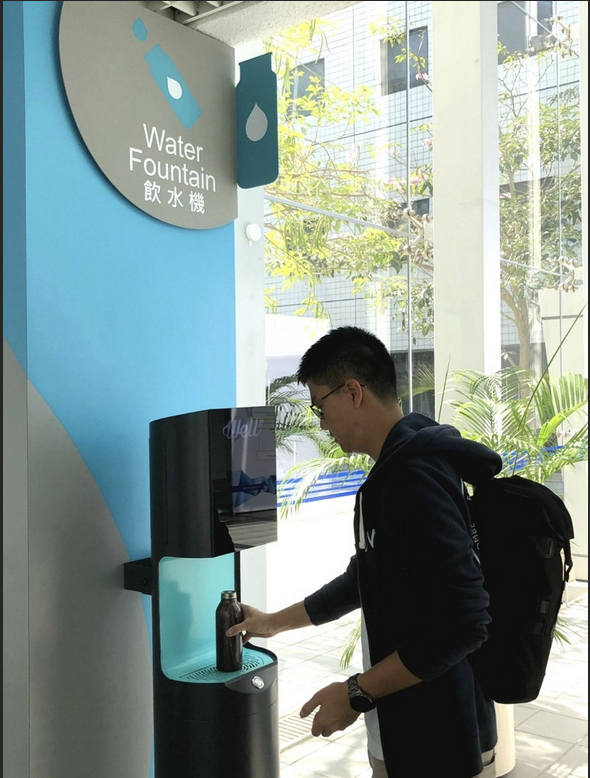
- Drinking water provision: We encourage all students to bring their own water bottle and refill them at our water fountains. There are more than 150 water fountains found around campus. Please click here for the location list of water fountains.
- Drinking water quality: Each water fountain is installed with filter and UV disinfection that removes particulates and kills bacteria. HKUST has established a potable water monitoring program. There is regular scheduled fountain maintenance. Water quality tests are also conducted regularly and as an integral part of the new campus building pre-occupancy process if new piping are installed.
- Living lab smart monitoring of drinking water dispensers: 50 mechanical drinking dispensers are equipped with Urban Spring Smart Hub to read water consumption and operational data in order to enable efficient drinking water facility management.
-
Real-time marine and aquatic ecosystem microplastics detection: HKUST is committed to protecting ecosystems, wildlife, and human health and welfare. This commitment extends beyond mere compliance to proactive measures and innovative approaches. In an effort to mitigate physical, chemical, and biological alterations of associated aquatic ecosystems, the university actively endorses and facilitates research and innovative projects focused on marine ecosystem preservation.
-
The Sustainable Smart Marine Grid (SSMG) project exemplifies this commitment. This innovative initiative integrates underwater surveying, debris removal, and data collection. By doing so, it facilitates the study of local marine ecosystems while actively contributing to their conservation through the removal of marine debris.
-
The project utilizes underwater robots to collect various data points, including CO2 levels. This comprehensive approach renders the project a valuable resource for a diverse range of stakeholders, encompassing the public, students, researchers, industry professionals, and government officials. The initiative employs regular video streaming across multiple platforms, including the Smart and Sustainable Campus Hub digital wall and a dedicated website, to showcase cleanup efforts and enhance public awareness of environmental conservation. With its focus on promoting sustainability and smart campus initiatives, this project has the potential to extend beyond HKUST, serving as a catalyst for more extensive marine surveying efforts throughout Hong Kong.
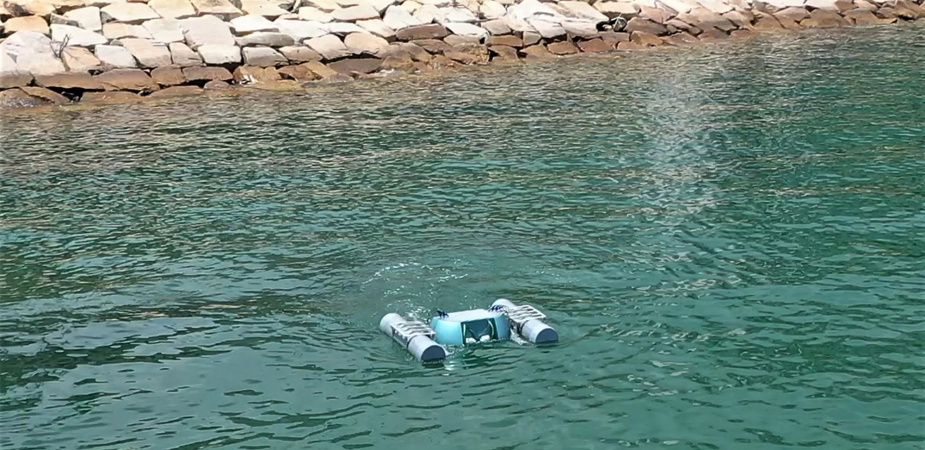
-
This recently implemented initiative aims to accomplish several objectives: raise awareness about marine pollution, demonstrate the impact of cleanup efforts, and provide crucial environmental data to various stakeholders. These efforts collectively contribute to minimizing physical, chemical, and biological alterations of aquatic marine ecosystems. Furthermore, the technology and knowledge derived from this project have the potential for broader application, potentially contributing to sustainable development efforts on a larger scale.
-
The project's future trajectory encompasses several promising avenues. Plans are in place to ensure system sustainability through the utilization of solar power and the pursuit of additional grants or support from the University and government for ongoing maintenance costs. The project team intends to showcase the system to the Government Agriculture, Fisheries, and Conservation Department (AFCD) and explore potential testing sites beyond its current location. Collaboration with the annual Reef Check initiative in Hong Kong is anticipated to enhance data collection capabilities and provide a more comprehensive and reliable data series. Additionally, there are plans to extend the system's deployment to the HKUST Guangzhou campus, particularly along the river, to broaden the project's scope and impact. The project is expected to serve as a foundation for future educational and research programs, including 3D reconstruction and the creation of a "Digital Twin" of the marine environment. The data collected will contribute to HKUST's marine research database and support ongoing studies on corals and general marine ecosystems.
-
Waterway cleanup: Partnering with SUPWAY Hong Kong, HKUST volunteers will kayak in Tai Mei Tuk, navigating through fresh-water ecosystems to clean-up refuse from civilization.
-
Beach cleanup: The campus community volunteers regularly schedule beach cleanup activities for our shoreline, reducing marine pollution. Recent services were held on 9 May 2024, 11 Oct 2023, and 27 Apr 2023.
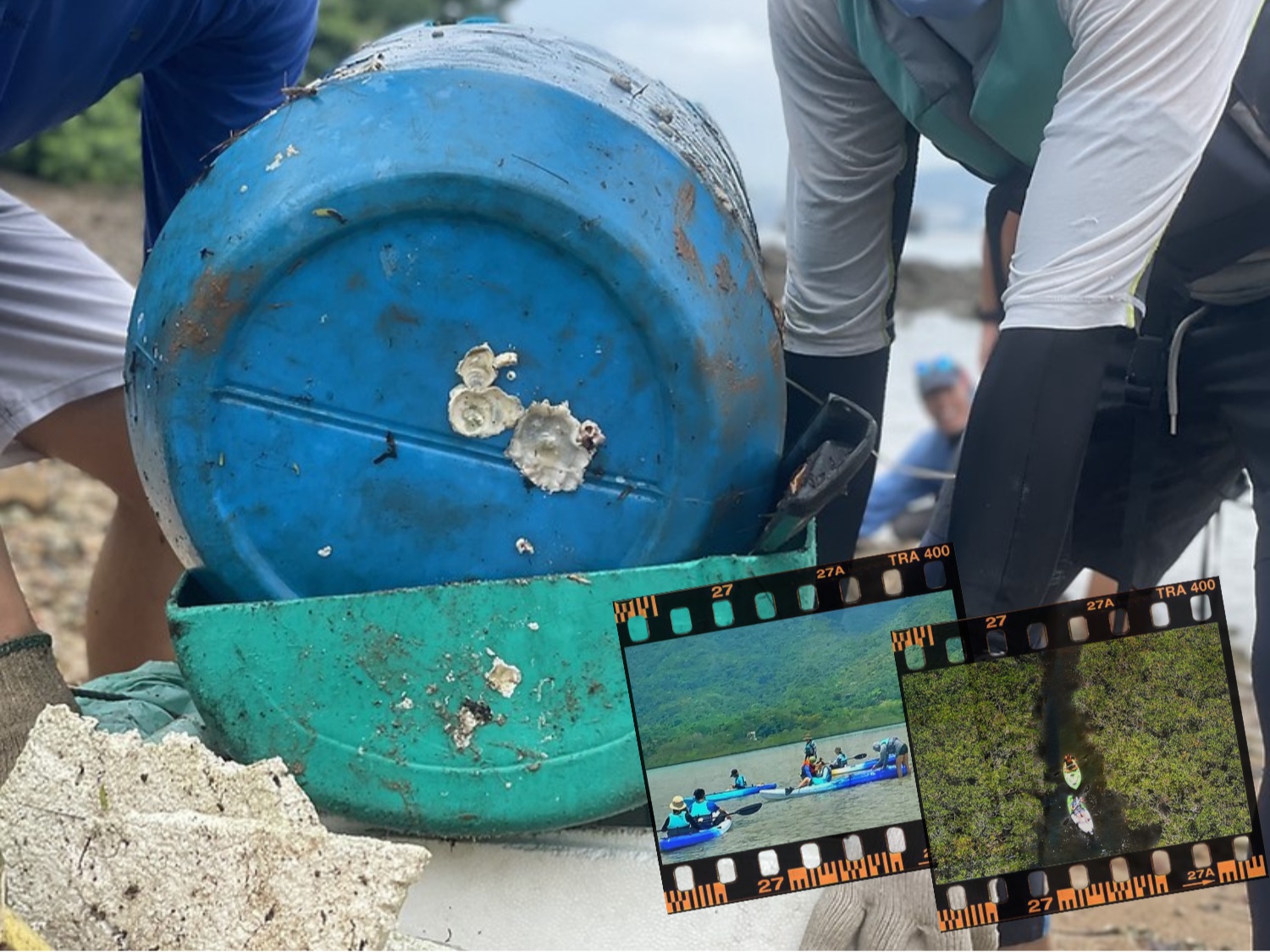
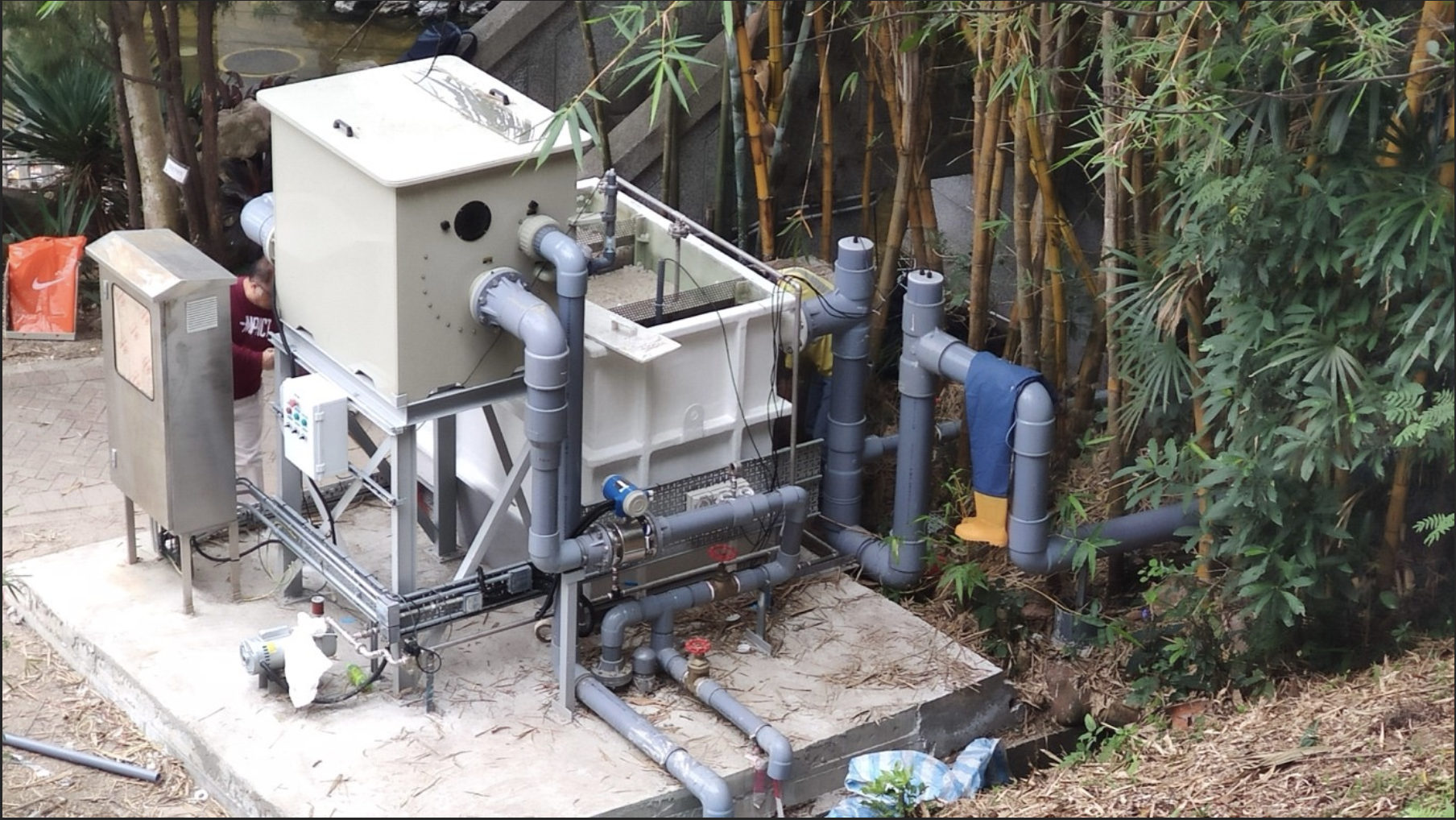
-
Wastewater discharge quality monitoring & treatment facilities: HKUST's wastewater management system channels effluents from laboratories, offices, and staff housing into the university's sanitary sewer network, which connects to a government Tseung Kwan O sewage treatment plant. The Environmental Protection Department (EPD) sets comprehensive standards for discharges through sewers linked to government treatment plants. HKUST maintains an EPD-issued license by strictly adhering to the license terms and conditions. In compliance with Hong Kong's wastewater treatment regulations, HKUST holds this license for using the sewage system connected to the government treatment plant.
-
HKUST uses local government wastewater treatment processes and facilities to treat wastewater across all buildings. The Drainage Services Department (page57) provides wastewater treatment services, with Tseung Kwan O Preliminary Treatment Works serving the wastewater discharge from HKUST. The Tseung Kwan O facility is a preliminary treatment work mainly removing solids by primary settling. The partially treated sewage is then channelled to the main treatment work at Stonecutters Island and undergoes Chemically Enhanced Primary Treatment (CEPT), which is currently the standard treatment for wastewater generated around Victoria Harbour and covered under the Harbour Area Treatment Scheme (HATS). The effluent after CEPT is discharged to the sea, with monitoring by EPD. The Government has committed to eventually adopting biological treatment for HATS.
- Details of HKUST's wastewater treatment process and relevant Hong Kong rules and regulations, including the municipal sewage system, can be found in our policy document – Chapter 19: Liquid Effluent and Protection of Watershed and Aquatic Environment.
-
On-campus living lab wastewater treatment system: HKUST has also adopted a wastewater technology to replace the existing pond filtration equipment. For more details, please refer to this link on beautifying the Chinese Garden pond and here.
-
On-campus living lab autonomous greywater treatment: The autonomous greywater treatment built prototype will be installed at the school halls’ restrooms, sports hall’s showering facilities, and the labs’ flushing devices. Freshwater consumption and pollution can be reduced. Refer to here for more details.
HKUST has implemented multiple water extraction and management technologies across campus that demonstrate our commitment to sustainable water practices. These technologies reduce potable water consumption, utilize alternative water sources, and minimize environmental impact through innovative extraction and recycling methods:
- Cooling tower bleed-off reuse: The cooling towers bleed-off at the HKUST Library will be used to supply water for toilet flushing. The condensate from the air handling units (AHUs) inside the library building is also collected and pumped to the cooling tower. Each year approximately 10,000m3 of water is reused.
-
Global Graduate Tower (GGT) rainwater reuse: The rainwater harvesting in GGT collects A/C condensate and rainwater, diverting them to a 37m³ fibreglass tank, and treating the water using filters and UV sterilizers. The harvested water subsequently serves 950m² of landscape area for irrigation purposes.
-
One University Road underground well: The project's scope encompassed the resumption of the underground water tank at One University Road for plant irrigation.
Image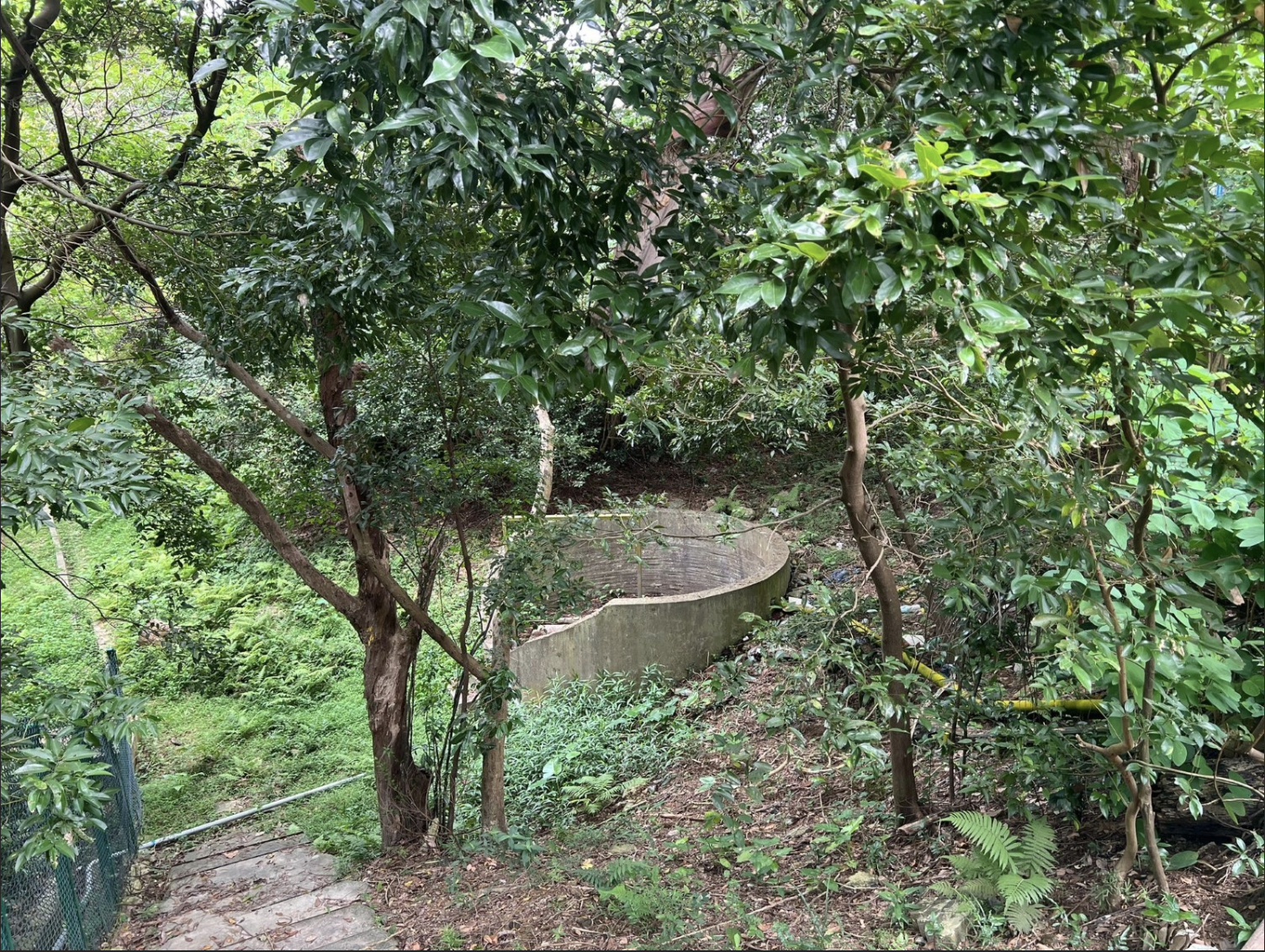
-
Seawater flushing: Seawater is extracted by the University from Clear Water Bay and used for our toilets. This practice of using seawater for toilets helps conserve precious fresh water for other purposes. This data is tracked monthly and shared publicly.
-
Seawater cooling: The district cooling system at HKUST serves the main academic building, Shaw Auditorium and Cheng Yu Tung Building. Seawater cooling is adopted for heat rejection. HKUST utilizes its coastal location to implement a seawater extraction and cooling system that provides sustainable cooling for multiple campus buildings. This system extracts seawater through environmentally designed intake structures that minimize marine ecosystem disruption. After use in heat exchange processes, the water is returned to the sea at controlled temperatures to prevent thermal pollution. This system reduces freshwater consumption by an estimated 9,000,000 cubic meters annually.
Image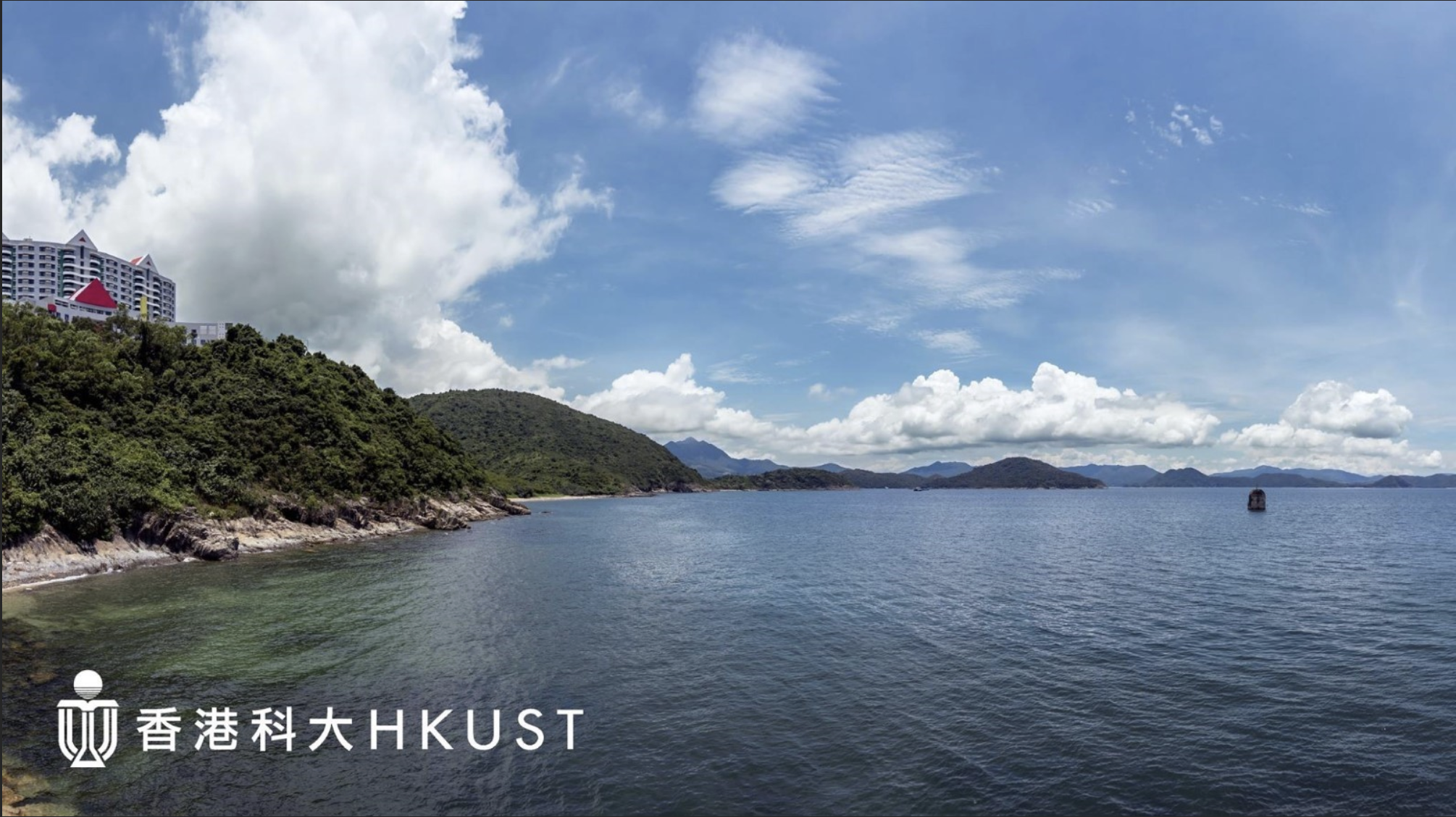
These sustainable water extraction technologies collectively reduce HKUST's reliance on municipal water supplies for non-potable uses, demonstrating our commitment to SDG 6 (Clean Water and Sanitation) and supporting our position as a leader in sustainable campus operations. All systems undergo quarterly performance reviews and annual sustainability assessments to ensure continued efficiency and environmental compliance.
Our ESG Report further details our water consumption performance and operation projects under the Environment – Water section.
HKUST’s research have been used to monitor the health of aquatic ecosystems, maintain and extend existing ecosytems and biodiversity, and enable the marine industry to minimize damage to aquatic ecosystems.
-
Marine research research institute / laboratory: The Hong Kong Branch of the Southern Marine Science and Engineering Guangdong Laboratory (Guangzhou) was established in 2019 at HKUST to advance the development of marine science and technology, optimize the marine industry structure for the Greater Bay Area's blue economy. Key research directions include response mechanism of marine ecosystems and life processes to environmental changes, marine environmental pollution and ecosafety, cold seep biodiversity, functioning, and genomics, and new technology for mining biological and microbiological.
-
Wastewater treatment research institute: The core research areas of HKUST’s institute for the Environment (IENV) includes water technology and resource management. Key achievements include advances in sewage treatment, cost-membrane bioreactor for wastewater reuse, furthering membrane introduction mass spectrometry (MMIS) for water filtration, as well as a treatment unit to recycle effluents discharged during textile operations. In particular, HKUST developed the SANI system which eliminated 70% of sewage sludge production, reducing space requirements and greenhouse gas emissions. This had been adopted in various government sewage treatment works in Hong Kong, as well as being promoted globally.
-
Open source ocean visualization platform: HKUST has developed the first interactive marine environment visualization platform called WavyOcean. This platform offers comprehensive data on the Greater Bay Area, the China Sea, and the Western Pacific Ocean. It provides physical and biogeochemical oceanic data, including 3D ocean currents, salinity, nitrate levels, and atmospheric variables. The platform greatly facilitates marine research, pollution analysis, ecosystem study, climate change analysis, and policy-making. By serving as a one-stop-shop platform, it enables policymakers and scientists to better study and utilize marine resources. Additionally, it helps mitigate the impact of climate change and assess the potential implications of new policies on marine ecosystems.
-
Regional aquatic ecosystem discovery: HKUST's research discovery on 'Hotspots' in the South China Sea will support the conservation of aquatic ecosystems and their biodiversity in the South China Sea. It will also help predict the impacts of climate change, and human activities on this vital ecosystem.
-
Living lab marine underwater surveying and trash cleaning project: The Sustainable Smart Marine Grid (SSMG) project combines continuous underwater surveying, trash cleaning, and data collection. This approach helps study the local marine ecosystem and actively contributes to its conservation by removing marine debris.
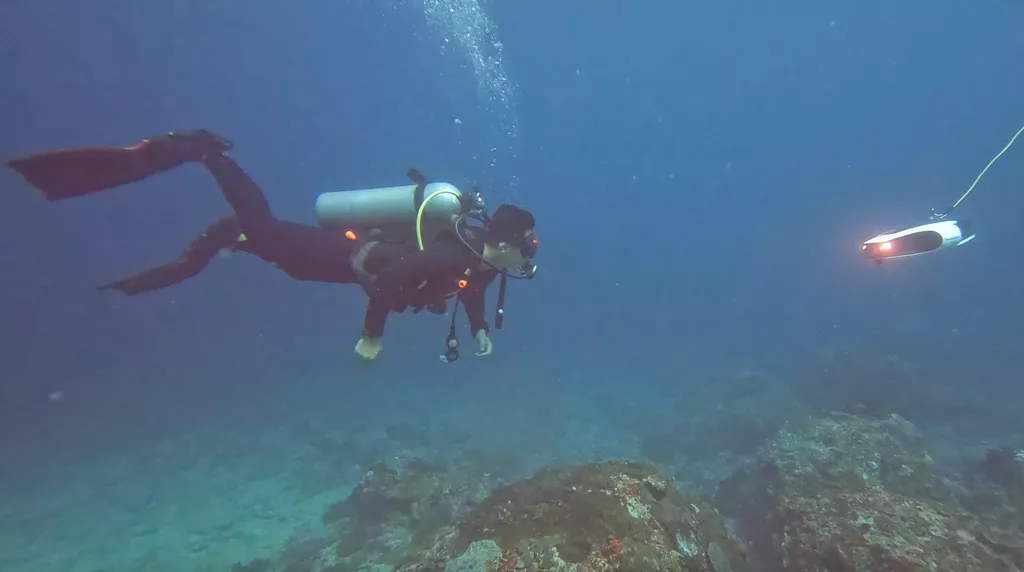
-
Living lab autonomous greywater treatment: The autonomous greywater treatment built prototype will be installed at the school halls’ restrooms, sports hall’s showering facilities, and the labs’ flushing devices. Freshwater consumption and pollution can be reduced. Refer to here for more details.
-
Living lab water management and usage projects on and off campus with industry collaboration: The smart water network living lab project tracks information about the aging and weakening of the pipes on campus, allowing the university to cut costs on repair and management, and educating students on the water loss and financial issues.
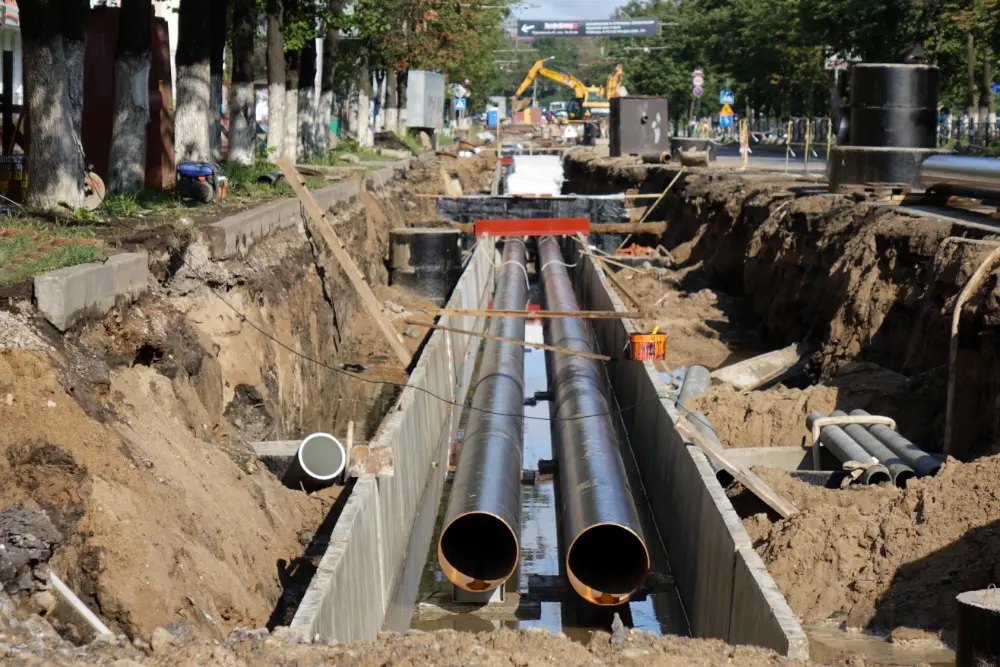
-
Living lab smart monitoring of drinking water dispensers: 50 mechanical drinking dispensers are equipped with Urban Spring Smart Hub to read water consumption and operational data to enable efficient drinking water facility management and to demystify water quality to the HKUST community.
-
Living lab wastewater treatment system: HKUST has also adopted a wastewater technology to replace the existing pond filtration equipment. For more details, please refer to this link on beautifying the Chinese Garden pond and here.
-
Living lab aquaponics system and vertical garden: The aquaponics and vertical garden systems tested on campus reduces the use of chemical fertilizer and marine pollution.
- Ban on one-time use bottled-water throughout campus: HKUST has launched a ban in the academic year of 2017-18 to become a disposable (one-time use) bottled water-free campus. As stipulated by the HKUST Sustainable Office Standards & Guidelines, offices are prohibited from the use of plastic, single-use bottled beverages at meetings and events. Within office spaces, there is the need to install a pipe filtration water refilling system to eliminate the use of bottled water.

-
Events minimizing plastic waste: In the HKUST Sustainable Events Guidelines, event organizers are encouraged to request and provide incentives for attendees to bring their own bottles, request for reusable cutlery, mugs and tableware to reduce plastic disposable items. Event materials are encouraged to be electronic and be reusable.
-
Biodegradable containers and lunchbox lending program: Our ESG report demonstrates that the University's action plan involves implementing strategies to eliminate disposable items from the campus eating establishments. (page 38) In 2022-23, the Phase 1 pilot program of biodegradable containers in restaurants across campus was kicked off. There is a comprehensive lunchbox lending program on campus (page 41). Two sets of lending and reverse vending machines were installed near the catering outlets, making 240 reusable lunchboxes available to the entire campus community. Furthermore, the University aims to leverage its purchasing power to encourage vendors to reduce the amount of packaging materials brought onto campus.
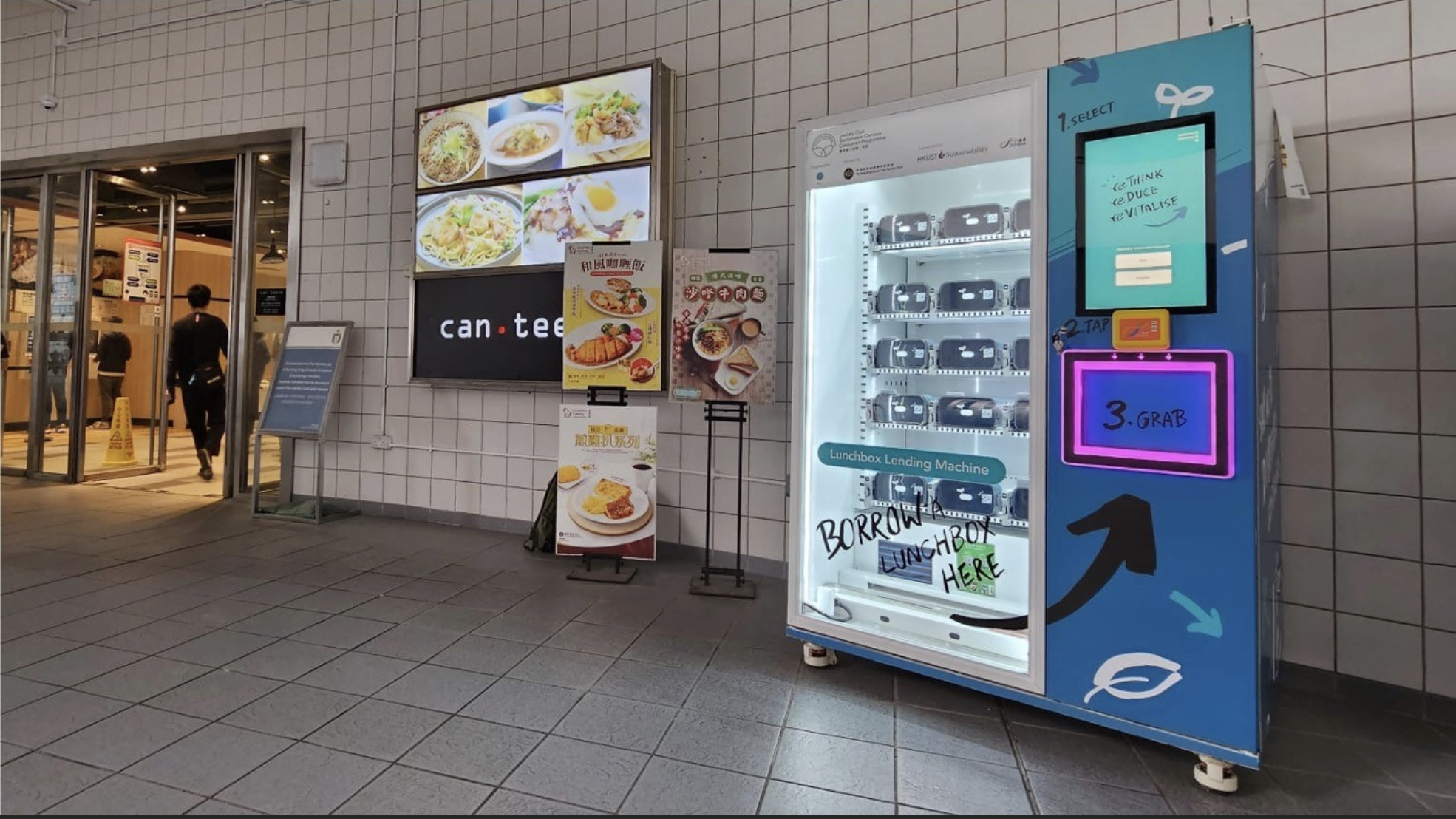
-
Ban on single-use plastic utensils and materials for caterers: The HKUST Sustainable Catering Policy indicates that the University mandates caterers to minimize and eventually eliminate the use of single-use plastic utensils and materials in their operations (Page 2). Additionally, there is a ban on selling single-use plastic water bottles on campus (Page 3).
-
Monitoring and reduction plans for plastic waste across campus: Plastic waste is tracked monthly with there being an ambitious overall general waste reduction target of 75% by 2028 as part of our 2028 Sustainability Challenge. Waste audits are being conducted regularly to identify locations and types of plastic waste being disposed.
-
Hong Kong government ban on disposable plastic products: On April 22, 2024, Hong Kong will take a significant stride towards environmental sustainability by implementing the first phase of the Regulation on Disposable Plastic Products, which will prohibit the sale and provision of 9 types of disposable plastic tableware that are small and difficult to recycle (including expanded polystyrene (EPS) tableware, straws, stirrers, cutlery, cups, and food containers) and other common products (e.g. cotton buds, umbrella bags, and hotel toiletries). HKUST catering outlets are now no longer be allowed to offer customers polystyrene products, disposable plastic straws, stirrers, cutlery or plates for dine-in and takeaway.
-
Living lab smart monitoring of drinking water dispensers: 50 mechanical drinking dispensers are equipped with Urban Spring Smart Hub with public dashboards displaying the number of bottles saved across campus, users will see their collective environmental footprints regarding single-use plastic bottles and water consumption. It aims to cultivate the Bring Your Own Bottle (BYOB) behavior through multi-level data visualization and innovative user interaction.
The Hong Kong University of Science and Technology (HKUST) delivers a comprehensive and integrated educational programme on fresh-water / aquatic ecosystems, sustainable management of fisheries, aquaculture and tourism, overfishing, marine conservation and sustainable utilization and good aquatic stewardship, covering SDGs 14.2.1, 14.2.2, 14.2.3, 14.3.1, 14.5.3, 14.5.4.
Fresh-water ecosystem educational programmes for Local and National Communities:
- Regular Reporting: The University regularly reports our performance and initiatives in minimizing our impact on portable water resources
- Working Group: The Water Reduction Working Group was established to identify water-saving strategies across various functions, including student halls, catering outlets, cooling towers, laboratories, and irrigation. Smart and/or Grade 1 showerheads will be replaced for nearly 100% of the showerheads in the student halls. Baseline monitoring of irrigation demand is also underway.
- Program: HKUST serves as the Project Management Office for the Jockey Club Sustainable Campus Consumer Program. This program delivers free community education through an innovative Smart Shower Head System, real-time water consumption dashboard demonstration, and student engagement initiatives. HKUST's Project Management Office has been collaborating with all member universities to develop strategies for water conservation education.
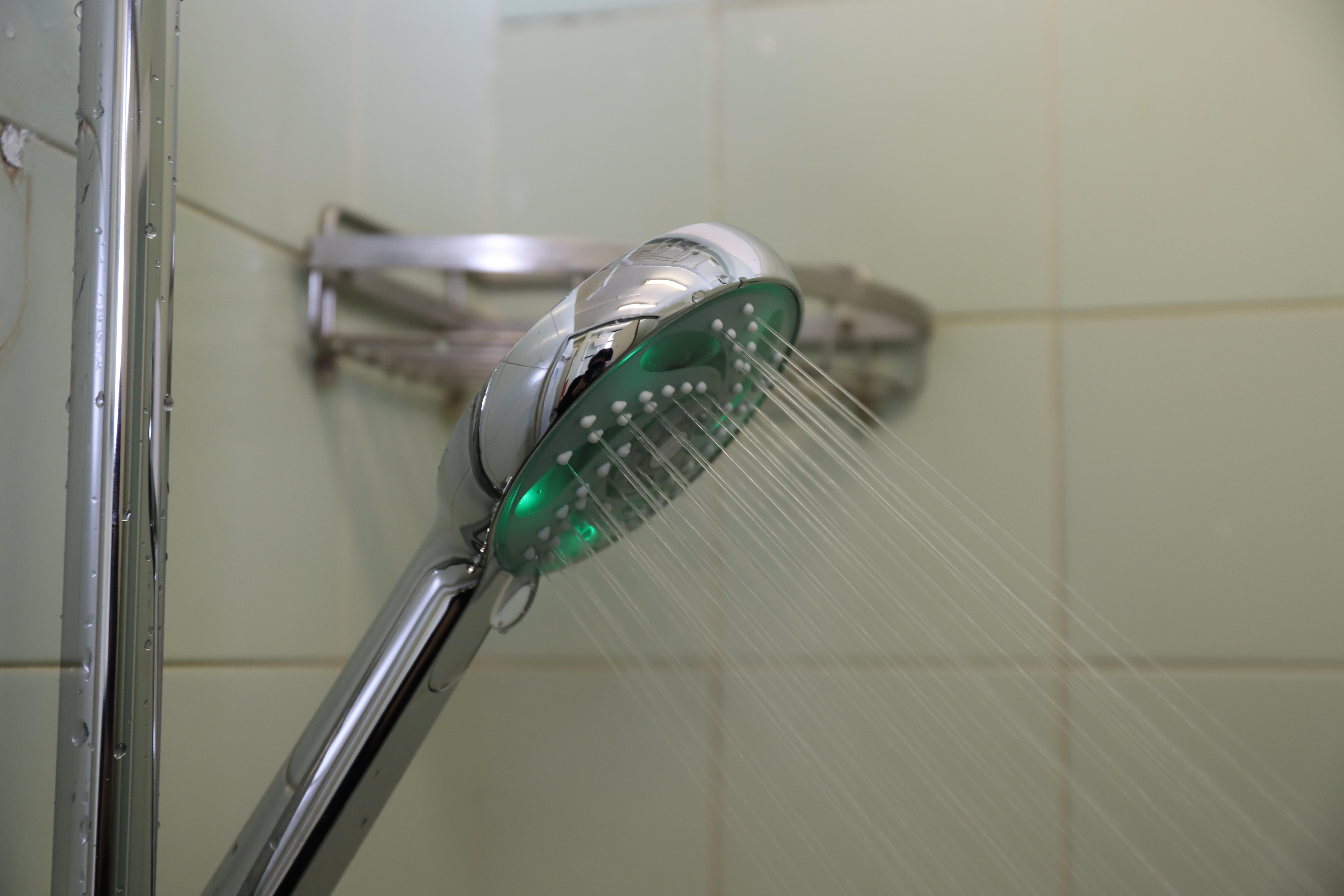
-
Conference: The Climate, Weather and Water Forum is held annually to facilitate an annual dialog among scientists, engineers, students, public and private enterprises and government entities on pressing issues related to preserving depleting water. Discussions include smart and sustainable urban water system, insights from big data and AI on water and sustainability, rainfall / precipitation, water quality and flow dynamics in rivers, flooding risks, and the effects of climate change on water resources. The CWWF2025 received tremendous support from the HKUST, government institutions, international organizations, and academic journals.
-
Workshops: The BSc in Ocean Science and Technology program offers diverse field trips and surveys. These programs offer students the opportunity to explore freshwater biodiversity in Sai Kung, visit Ocean Park's nursery facilities to learn about artificial breeding programs for endangered local freshwater turtles like the Beale's eyed turtle, and participate in regular field surveys to study the diversity and abundance of plants and animals in local wetlands.
-
Waterway Cleanup: Partnering with SUPWAY Hong Kong, HKUST volunteers will kayak in Tai Mei Tuk, navigating through fresh-water ecosystems to clean-up refuse from civilization.
-
Smart Water Network: The University funded the Smart Water Network project with the Sustainable Smart Campus as a Living Lab (SSC) fund to reduce water leakage on campus and in Hong Kong in close collaboration with the HK Water Supplies Department (WSD). Inaugral workshop was hosted to share knowledge and experiences on the project, the research students as well as young scientists and engineers in the fields of water science and acoustic communication in Hong Kong were invited to attend for free the activities of this workshop.
-
Water Resources and Sustainable Development - Special Lecture and Sustainable Smart Campus (SSC) Project Demonstration: HKUST will host a special lecture on 26 Sep 2025 and SSC project demonstration for the local secondary school students, university students and staff, and alumni. The event includes documentary screening, guest speaker sharing, and sharing from a water leakage detection project to learn about good water management, reinforcing HKUST’s commitment to off-campus water conservation support and its role in actively promoting conscious water usage on campus and in the wider community. By engaging students and educators alike, the event aims to foster a culture of awareness and responsibility around water resources. In addition to water conservation, the campus tour will also introduce the SSC project "Oyster Habitats for Water Quality and Biodiversity", which touch on the sustainable management of fisheries, aquaculture, and tourism, as well as raising awareness for the consequences of overfishing, illegal, unreported, and unregulated fishing, and destructive fishing practices. Another project "Revolutionising Food Waste Management with Black Solder Flies", and site visit to reusable lunchboxes machines and solar panels are also included.
-
Collaboration with The Nature Conservancy: HKUST collaborated with The Nature Conservancy to host an inspiring educational programme and outreach event for our staff, students, and the local community. The programme focused on marine conservation, particularly the sustainable management of fisheries, aquaculture, and tourism, as well as raising awareness for the consequences of overfishing, illegal, unreported, and unregulated fishing, and destructive fishing practices.
Sustainable fisheries educational programmes & aquatic ecosystems community collaboration:
-
Research: A team led by the Hong Kong University of Science and Technology (HKUST) has developed a technique to study how different fish species interact with each other in a coastal region, a breakthrough that helps explain the complex relationships among marine species and how global warming impacts fish populations.
-
Conference: The Ocean-HK Symposium is an annual event held at HKUST since 2017. It brings together scientists from Hong Kong and mainland China to discuss eutrophication, hypoxia, and their ecosystem consequences in the waters around Hong Kong. The symposium serves as a platform to enhance understanding of the impacts of eutrophication and hypoxia on the marine ecosystem and develop strategies to mitigate them.
-
Seminars: HKUST held a community talk titled Our Plastic Ocean with WWF Hong Kong, a conservation organization for plastic pollution in Hong Kong's oceans. They shared insights on global and local plastic pollution, past and ongoing WWF initiatives, and practical ways to reduce plastic waste. These efforts help preserve Hong Kong's aquatic ecosystems. Our seminar “Fish as a bioindicator for monitoring water systems” is provides an understanding of fisheries and marine pollution.
Overfishing educational programmes:
-
Seminars: HKUST held an educational seminar on the environmental stress on early life stages of fish that was open to the public. This seminar highlighted the important role of fish in the ecosystem, the case studies on fish ecotoxicology, and their potential ecological implications. The speaker also covered threats to fish ecosystems, including illegal and destructive fishing practices worldwide. In the WWF Sustainable Seafood seminar, HKUST also collaborated with WWF to discuss WWF's Sustainable Seafood Guide and its program to educate the local community in relations to overfishing and regulations. This event is an opportunity to explore the broader impact of our seafood consumption choices and how they contribute to sustainable practices.
-
Workshops: The Jockey Club Sustainable Campus Programme (JCSCP) is a three-year project launched in 2021 by Hong Kong Sustainable Campus Consortium (HKSCC), a platform comprising 8 universities in HK. The JCSCP aims to promote sustainability practices within universities' campus communities. As part of the JCSCP, HKUST co-organized the Eco Fish Series free event. This event educated students about local sustainable aquaculture, promoted the value of local pond fish culture, provided hands-on experience in sustainable diet and fishing demonstrations with local fish farmers, and raised awareness of illegal fishing practices.
Ocean conservation & aquatic stewardship education programmes:
- Conferences:
-
In the upcoming French Science Festival on “Oceans of knowledge” organized by the Consulate General of France in Hong Kong and Macau, the Department of Ocean Science, HKUST in Oct 2024, publicly available marine and ocean science activities will include exhibition, interactive fieldwork and workshops, lab visits, and showcase of tools/technologies used in interactive oceanography games, presentation of innovative ocean research projects, screening, talks and VR experience. This includes plankton workshop, “fish printing” workshop, film screening / talk on oyster reed and shellfish ecosystem and public talks on marine challenges and climate change impacts on coral ecosystems.
-
Ocean Day took place in Mar 2024 and provided the public with a platform for individuals to get in touch with the marine world. Some of the highlights included the ‘Quest of Ocean” game app, display of marine laboratory equipment, as well as education boards on diverse topics related to ocean science, such as Ocean Heating, Marine Molecular Ecology and Challenge and Mitigation in Ocean of HK and GBA.
Image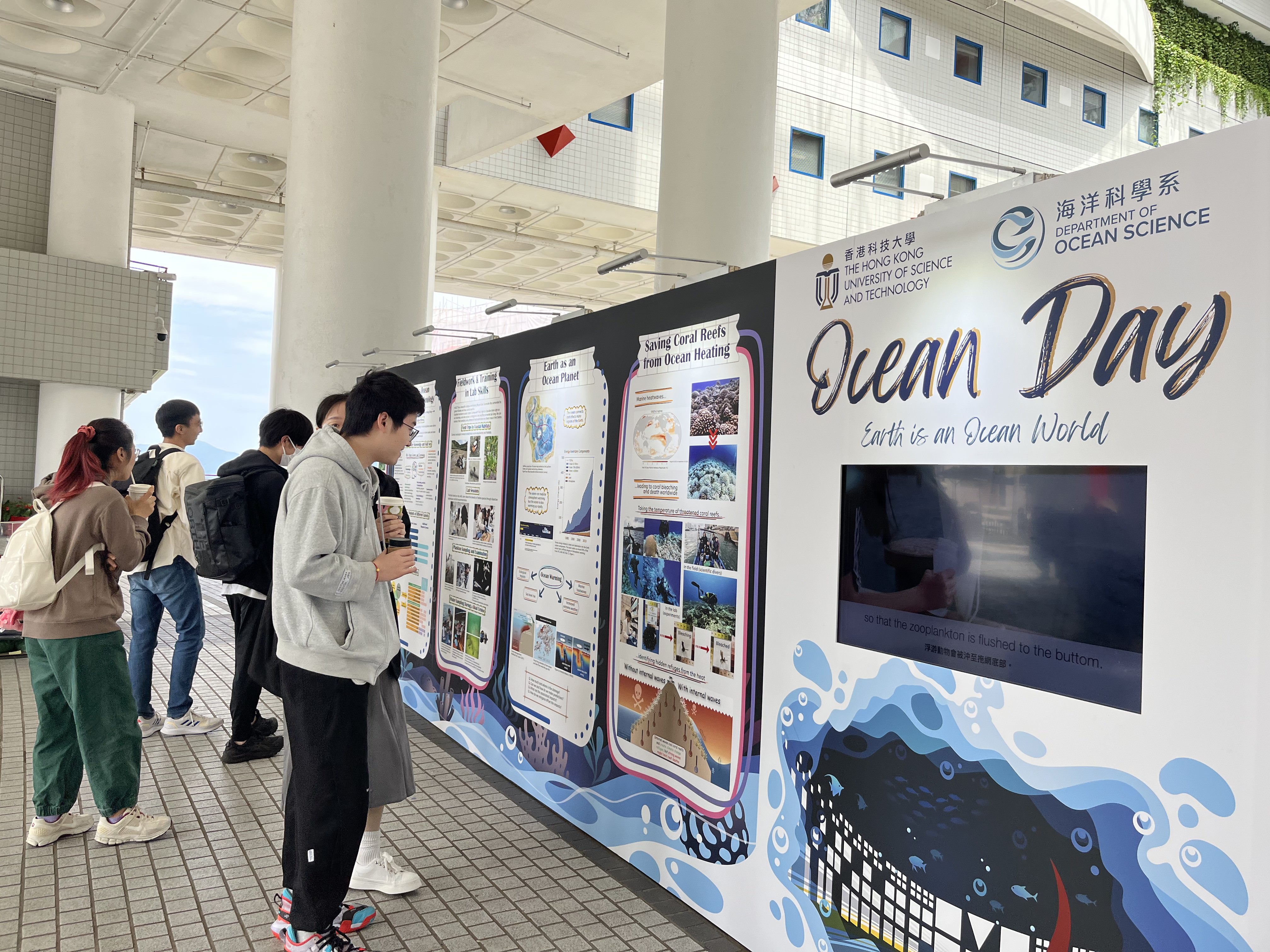
-
The inaugural Hong Kong-Macau Ocean Forum, organized by the HKUST Center for Ocean Research (CORE) in Nov 2022, brought together experts, scholars, students, and government officials to discuss marine environmental security and sustainable development. Topics covered at the form included: 1) Ocean hydrodynamics and climate change, 2) Ocean carbon cycle and biogeochemical processes, 3) Marine interdisciplinary discipline and marine technology, 4) Coupled atmosphere-ocean dynamics and climate change, 5) Biogeochemical cycles in the ocean-land-atmospheric system and carbon neutrality, and 6) Ocean technology, digital-twin, and blue economy.
-
The 2nd International Symposium on Marine Science and Technology for Young Scientists and Postgraduates held in Jul 2022 brought together researchers to discuss recent advances in marine ecosystem and safety, deep sea biology and marine resources and technology.
-
The "Blue Marine Economy Summit" was held on Jun 2022. This summit covered various aspects of marine economy, ranging from government policies, local and global maritime security as well as different industrial fields involving the marine industry.
-
The HKUST x France One Ocean Conference in May 2022 formed part of the international One Ocean Summit supported by the Consulate General of France. This conference will brought together speakers from academia, business community and civil society to discuss the future of our oceans. Panel 1 discusses “The Preservation Of Our Oceans: What can we do to protect marine life?” including plastic pollution, proliferation of invasive species, habitat degradation, changes in ecosystem functions… numerous issues are threatening the marine environment. Panel 2 discusses “The Blue Finance Challenge: How can finance positively impact the health of the ocean?” This panel will examine how the financial sector can steer ocean industries towards sustainability.
-
-
Open source ocean visualization platform: HKUST has developed the first interactive marine environment visualization platform called WavyOcean. This platform offers comprehensive data on the Greater Bay Area, the China Sea, and the Western Pacific Ocean. It provides physical and biogeochemical oceanic data, including 3D ocean currents, salinity, nitrate levels, and atmospheric variables. The platform greatly facilitates marine research, pollution analysis, ecosystem study, climate change analysis, and policy-making. By serving as a one-stop-shop platform, it enables policymakers and scientists to better study and utilize marine resources. Additionally, it helps mitigate the impact of climate change and assess the potential implications of new policies on marine ecosystems.
Image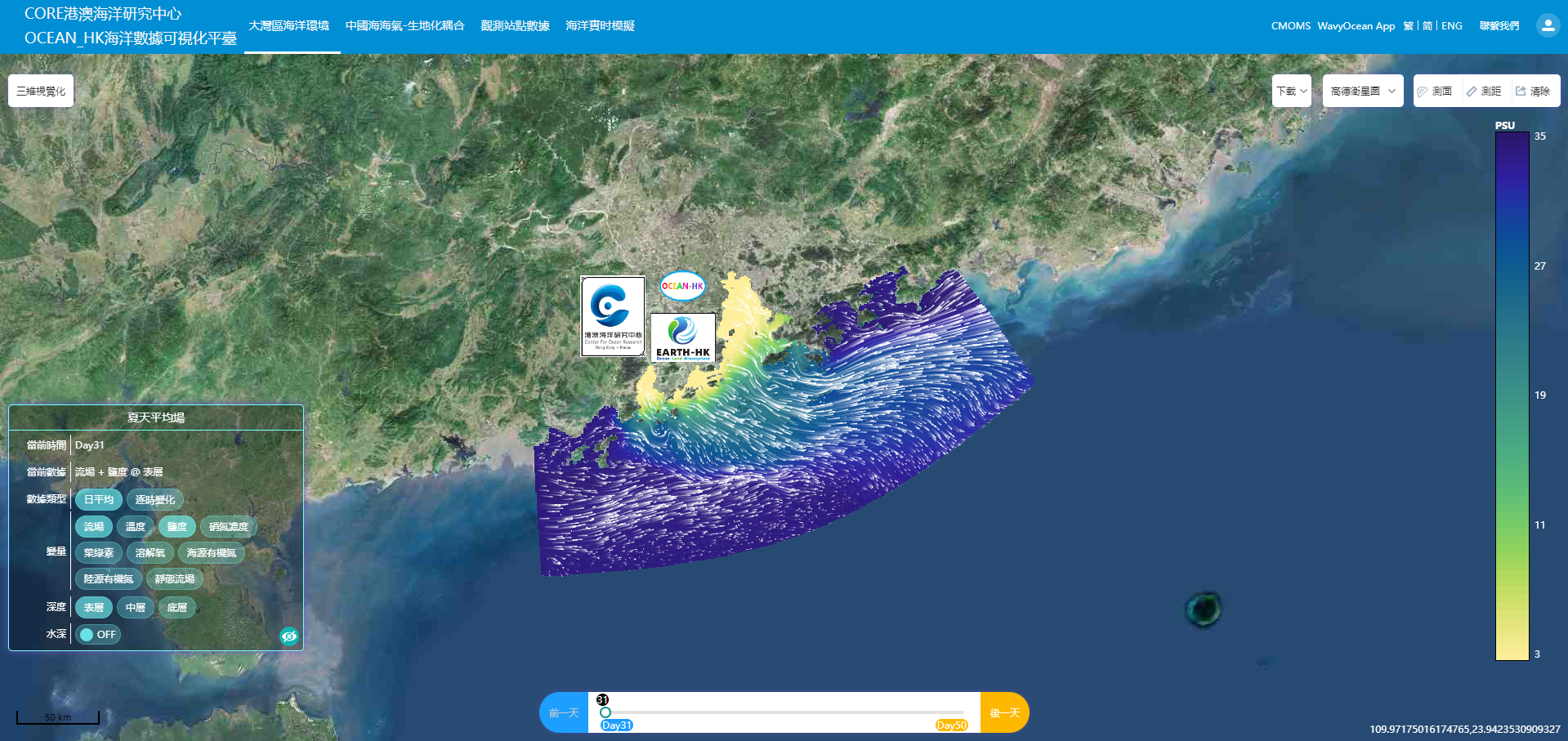
-
Open source marine biology app: The marine biology app aims to integrate augmented reality simulation aids with multi-modal learning resources to facilitate an experiential learning experience for field trips and laboratory sessions on marine environment.
Image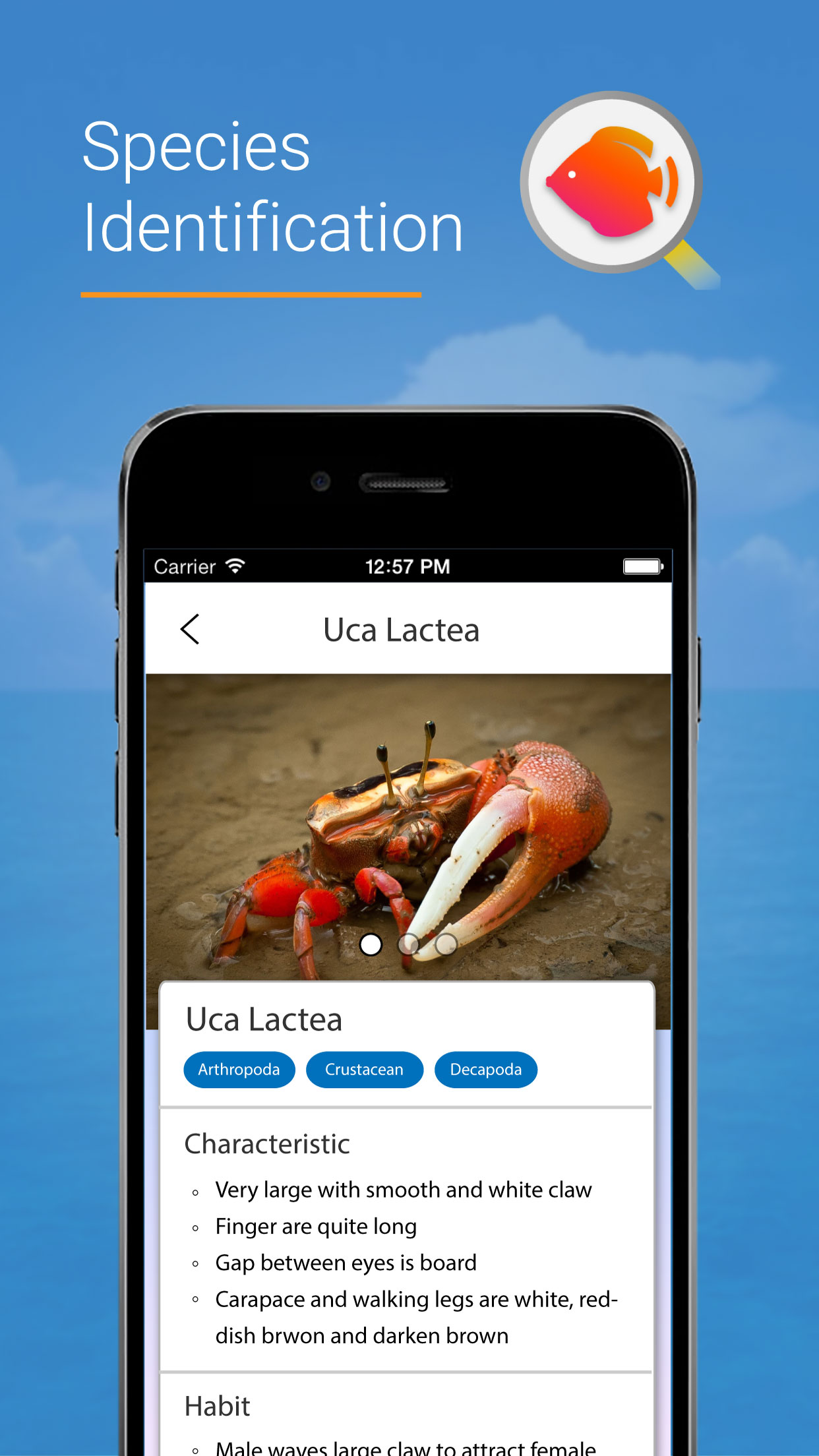
-
Extended reality marine education: The project aims to design a game app with immersive Virtual Reality (VR) eLearning tools with AI machine-learning platform “MarineGPT”. Our MarineGPT not only pushes the boundaries of marine understanding to the general public but also offers a standard protocol for adapting a general-purpose assistant to downstream domain-specific experts.
Image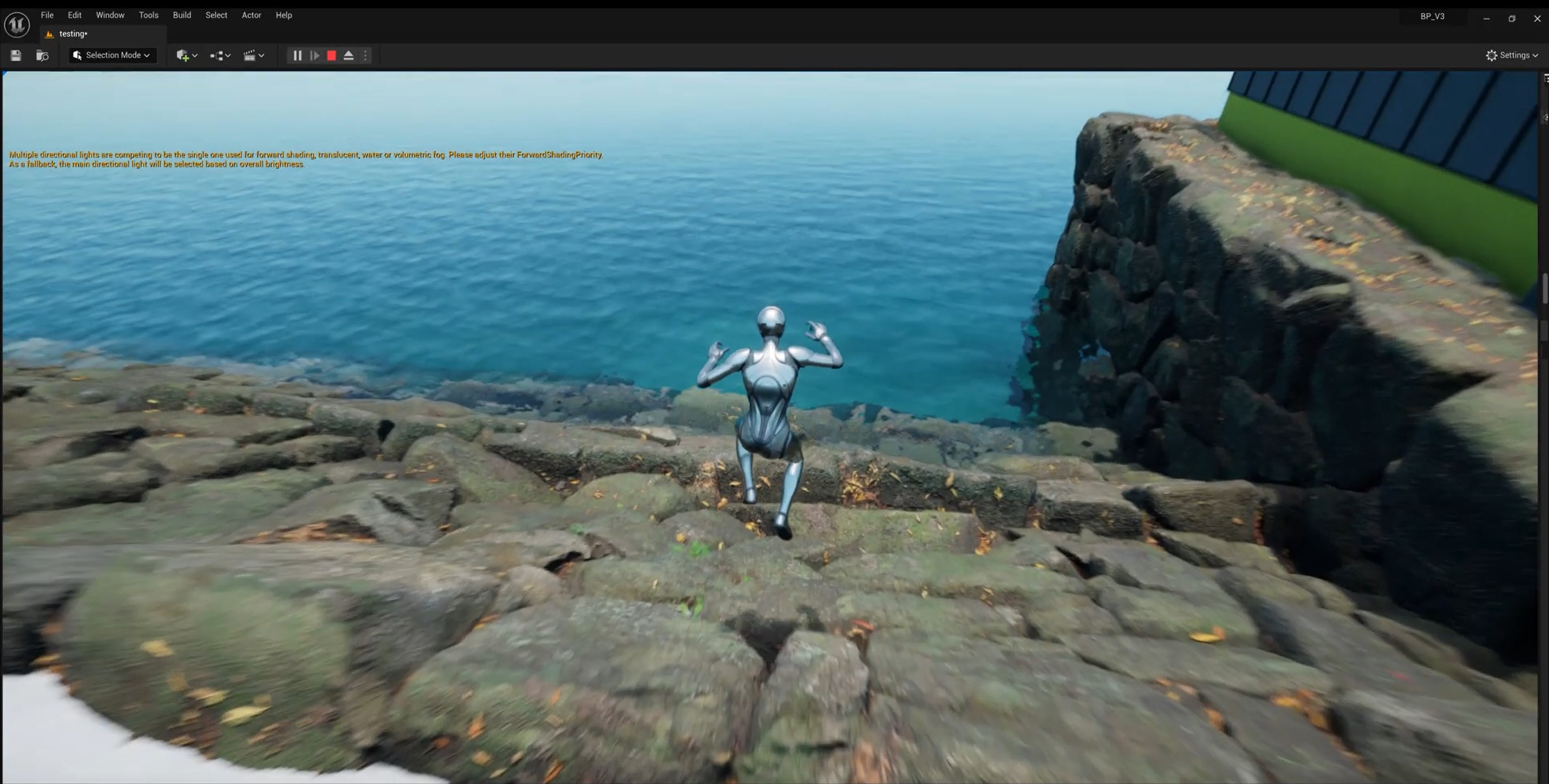
-
Seminars:
-
‘Discovering Ocean Science 2024’ summer course was held for secondary / high school students whereby they conducted phytoplankton identification using sample from HKUST Pier.
Image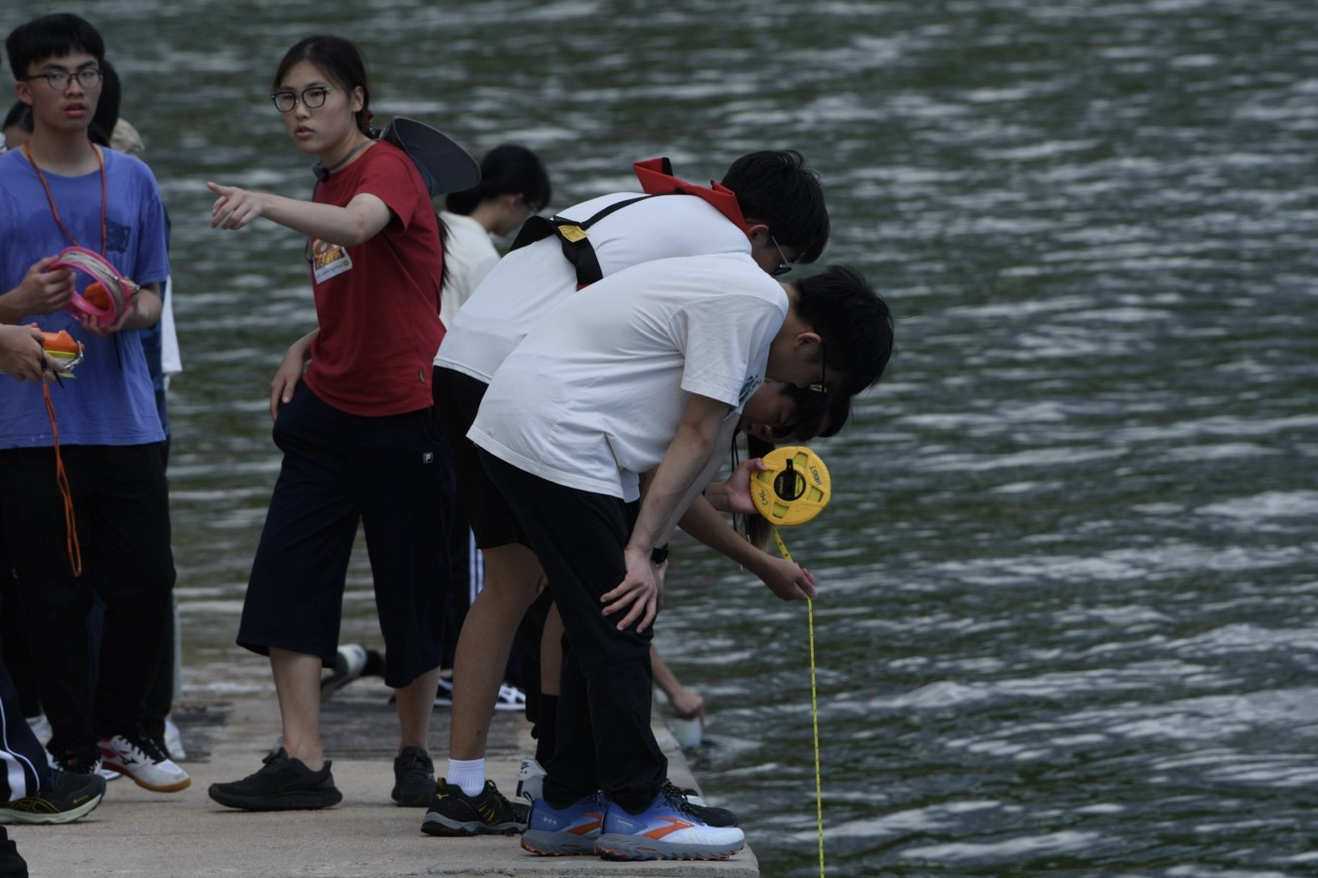
-
The seminar on “Monitoring and forecasting aquatic ecosystem dynamics using environmental DNA and statistical modelling” provides a public sharing on a promising tool for effective and comprehensive biodiversity monitoring, especially in aquatic systems. This will contribute to forecasting future biodiversity changes, and potentially, sustainable ecosystem and society.
-
The Hong Kong Branch 2nd Annual Meeting International Conference on Marine Ecosystem and Resources feature talks for marine environmental pollution and ecosafety, response mechanism of ecosystems to environmental changes, and new technology for mining biological resources in the Greater Bay Area and South China Sea.
-
The Hong Kong Branch of the Southern Marine Science and Engineering Guangdong Laboratory (Guangzhou) established by HKUST hosts regular visiting scholar seminars related to the marine environment, coral reefs, and the impact of contaminants on marine ecosystems, which are relevant to SDG 14, which focuses on the conservation and sustainable use of oceans, seas, and marine resources.
-
-
Workshops:
-
The BSc in Ocean Science and Technology program offers an on-going program courses, OCES 2100 - Conservation Field Trips to introduce students to local conservation for marine and wetland environments through field visits.
-
The Dolphin Watching Boat Tour provided students with a deeper understanding of Hong Kong's marine biodiversity and served as a vivid demonstration of the intersection of conservation management and tourism in marine habitats.
-
-
Beach cleanup: The campus community volunteers regularly schedule beach cleanup activities for our shoreline, reducing marine pollution. Recent services were held on 8 April 2025, 9 May 2024, 11 Oct 2023, and 27 Apr 2023.
Image